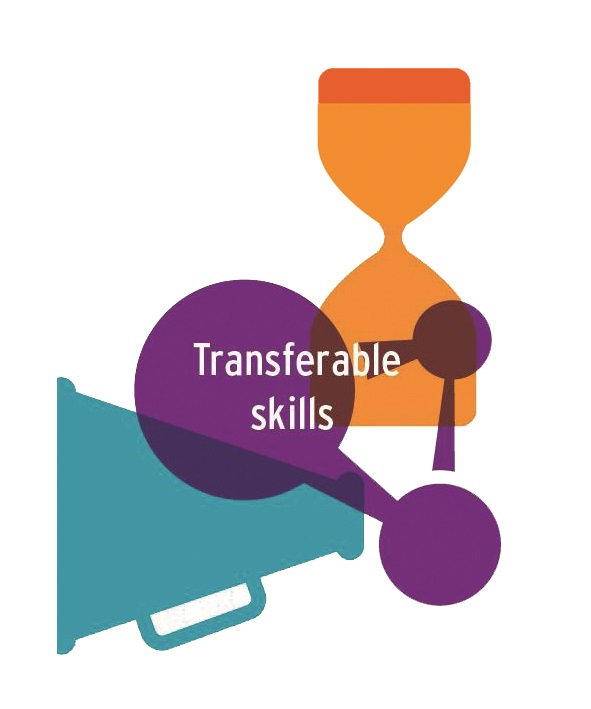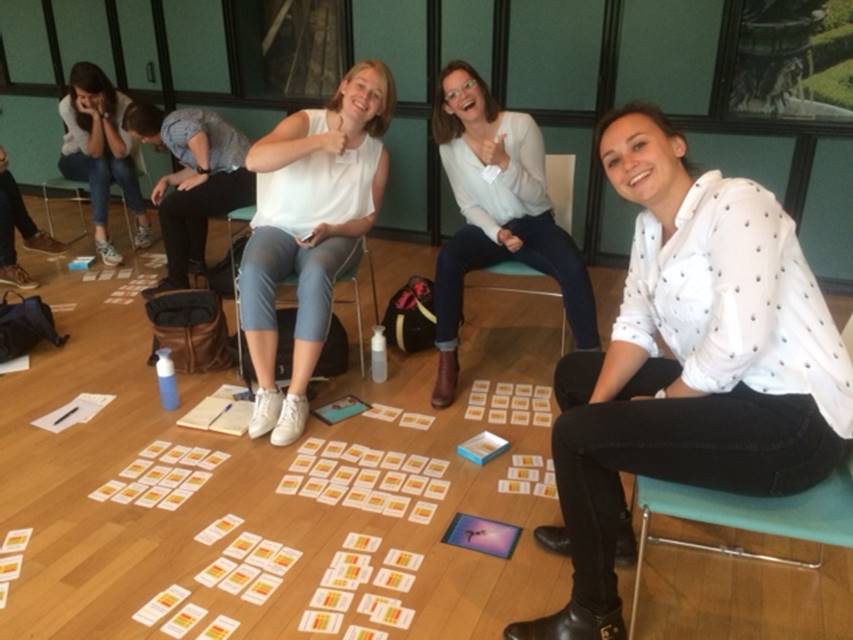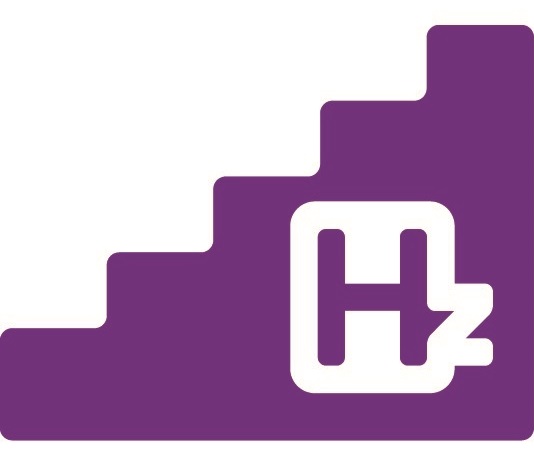Transferable Skills Game
Manual
Number of players: 3 – 24. Duration: appr. 1 hour.
This game was created for researchers who want to learn about the skills and qualities they already have, and to think about which ones they can still develop. It is also meant for professionals who are assisting researchers in this process. It can be used in various settings like a training course, coaching interview or job interview.
Researchers tend to be aware of their skill set where specific to their field of research but have a much less clear picture of their general skills or qualities. These include, for example, the skills and qualities needed to start and complete complex projects; to work independently; to supervise others; and, to communicate research results to the outside world. All researchers possess a variety of general skills, also called Transferable Skills. These are skills that they can use in many different situations, also beyond the university. When planning their career it is important to be aware of these and to be able to communicate about them with others.

At the beginning of the course, have all the participants make a list of the skills they possess. Almost everyone finds this difficult and the lists are usually quite short. In part this is because researchers only rarely receive positive feedback from their supervisors or colleagues. Also, in Dutch academic culture it is often seen as ‘bragging’ when you say you’re good at something.
- Reassure the participants and tell them that they have more skills than they can think of now and that this exercise will help them to become aware of them.
- Explain the Transferable Skills concept.
- Divide the group into subgroups of 3- 4 people and divide the cards among the subgroups.
- Participants place the stack of cards face down in the middle of the table. One by one the cards are turned over to show the skill on the card. The participants may ‘compete’ for the card by providing a good example of a recent situation in which they successfully applied the skill or quality on the card. If they succeed in convincing the other players, they get to have the card and place it in front of them on the table.
- At the end of the exercise, the participants write down which skills or characteristics they have, which they don’t have, and which they would like to develop. This can be done using the Skills placemat.
- Participants now have a clearer idea of their own skills and characteristics and have also become better at communicating about them. The latter is important, for example, in a job interview.
It’s not possible to go through all the cards within one hour. Therefore, at the end of the training, hand out the complete list of 52 skills and qualities to all participants so they can continue the exercise at home if they want. https://www.bhertz.nl/good-reads/, under the button [downloads] at ‘Career’: Transferable Skills and Characteristics – Overview.
More about our Transferable Skills training courses.

The game is very suitable to use in a coaching context.
Put all the cards face up on the table. Ask the coachee to select the ten skills or qualities that she/he identify with most, and then ask the coachee to provide good examples of recent situations in which she/he successfully used each of these the skills. Also ask the coachee to pick out skills she/he would like to develop and skills she/he doesn’t find relevant in her/his work.
Together, try to divide the selected cards into various categories. For example, you can arrange them according to what features more heavily:
- Me or others
- People or things
- Thinking or doing
Or gather them into overarching categories such as:
- Oral and written communication
- Collaboration
- Leadership
- Cognitive skills
- Project management & organisation
- Self-management
Then have a brainstorm together about which roles and careers are a good fit for this selection of skills, for instance: researcher, advisor, researcher or manager at a research and development department, own company, lecturer, museum curator, journalist, policy staff member, desk researcher, trainer.
Ask the coachee to think about what steps she/he can take to continue to develop certain skills. Together, make these steps SMART (Specific, Measurable, Aspirational, Realistic and Time limited).

To use the game in a job interview, first in consultation with the selection committee draw up a profile of the traits you are looking for in a candidate. This will provide a clear overview of the skills and qualities which are essential for this position. If the interview concerns selecting a PhD candidate, we recommend reading the article ‘The transition to independent researcher: Who makes it, who doesn’t, and why’ by Lovitts (2008). Also see: https://www.bhertz.nl/good-reads/ under the button [downloads] and the heading ‘Career’.
Ask the applicant to select the ten skills or qualities she/he identifies with most, and discuss in which recent situations she/he has successfully applied the skill or quality in question. Also ask about any skills she/he is interested in developing.
Use the STARR method to ask questions (see https://www.bhertz.nl/good-reads/downloads).
After the interview, compare the discussed skills and qualities with the profile you prepared in advance.
This is also discussed in our workshop Selection and Job Application.
